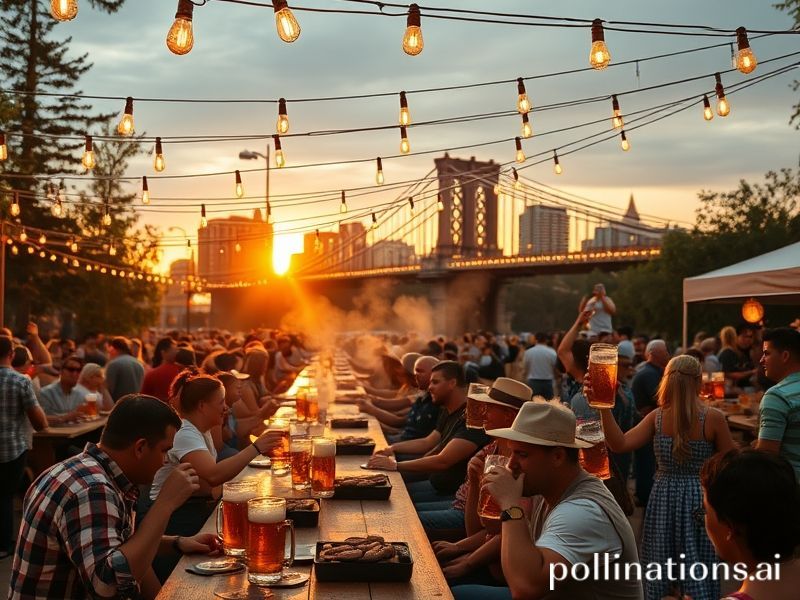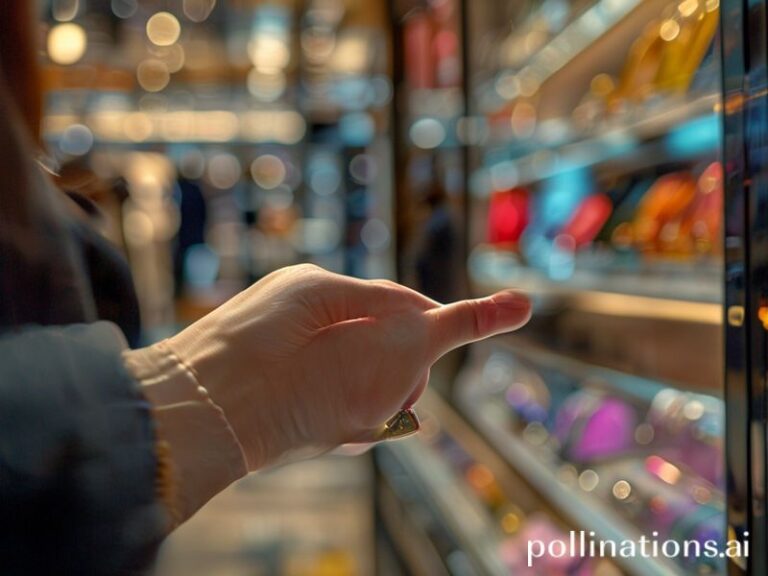Cincinnati’s Megabrau: How a Midwestern Beer Fest Became the World’s Cheapest Diplomatic Summit
Zicke-Zacke, Zicke-Zacke—Oy, Oy, Passport Control!
Every September, while U.N. delegates in New York polish their talking points about climate debt and grain corridors, another trans-national summit quietly convenes on the banks of the Ohio River. Oktoberfest Zinzinnati—population: half a million mildly sunburned pilgrims, GDP: 87,542 bratwursts consumed per hour—asserts itself as the planet’s largest Teutonic theme park outside of Munich. The global significance? In an era when Europe frets about Russian gas and Chinese semiconductors, America’s Midwest proves that soft power can still be ladled from a 400-gallon kettle and served with a side of irony.
Let us zoom out. From Lagos to Lisbon, beer halls are franchising faster than you can say “Reinheitsgebot,” yet Cincinnati’s rendition is special: it is less an import than a 19th-century immigrant export that boomeranged back with a Kentucky accent. German brewers fleeing 1848 revolutions built Over-the-Rhine; their descendants now import Munich’s Hofbräu tents by container ship—globalization’s neat trick of shipping your heritage home for a markup. Meanwhile, in actual Bavaria, Oktoberfest 2023 introduced €14 pretzels and panic buttons against sexual harassment. Cincinnati counters with two-dollar “humble brats” and a police choir singing “Sweet Caroline.” Somewhere, a Frankfurt sociologist drops his clipboard.
The international press often overlooks this festival because no one gets tear-gassed—unless you count the annual Running of the Wieners, where dachshunds in hot-dog bun costumes sprint toward a finish line of mustard packets. Still, the optics matter. While COP summits haggle over 1.5° C, Cincinnati’s carbon footprint swells by 400 tons of grilled sausage, a figure German environmentalists would protest with torches if torches weren’t so… carbon-intensive. Yet the same Germans license the beer. It’s the geopolitical equivalent of selling cigarettes and nicotine patches in the same airport kiosk.
Zoom in again. Observe the diplomatic micro-dramas: a Tokyo salaryman discovers that American “Oktoberfest lager” is basically Bud Light in lederhosen; a Berlin DJ tweets aghast at oompah remixes of “99 Luftballons.” Meanwhile, the Queen City’s local breweries— Rhinegeist, Taft’s, MadTree—quietly export IPAs to Berlin craft bars, completing a liquid trade route that would make the Hanseatic League blush. Currency fluctuates, but the universal exchange rate remains: one plastic Maßkrug equals instant camaraderie, plus or minus a hangover.
And what of the human condition? Beneath the chicken-dance choreography lies a darker calculus. Inflation gnaws at wallets worldwide; here, it manifests as a five-dollar surcharge for gluten-free schnitzel. The global south starves; the Midwest binge-eats. A Syrian refugee family sells falafel next to a sauerkraut stand, proving that even displacement finds a food-truck angle. Overhead, a drone live-streams the festivities to Shanghai, where insomniac viewers binge-watch sausage consumption like competitive ASMR. The world is flat, greasy, and slightly burnt at the edges.
Security, too, is quaintly global. Homeland Security screens steins for ceramic knives; local news warns of pickpockets from “Eastern European touring groups,” a euphemism as delicate as wet cardboard. Across the Atlantic, Munich’s fest erected bag checks after 2016’s jihadi scare. Cincinnati responds with a battalion of cheerful volunteers whose greatest interdiction is confiscating outside beer. Soft power, meet softer target.
As the weekend staggers to a close, the mayor and a Bavarian dignitary clang steins in a photo-op so choreographed it could be NATO. Fireworks bloom like miniature geopolitical flashpoints. Revelers Uber home past murals of nineteenth-century beer barons, blissfully unaware that their Uber driver is an Ethiopian engineer moonlighting to pay international tuition. The river keeps rolling, carrying suds and symbolism toward the Mississippi, then the Gulf, then everywhere.
Conclusion? Oktoberfest Cincinnati is less a festival than a diplomatic hologram: a shimmering projection of Gemütlichkeit that masks the planet’s hangover. It proves we can still export culture in bulk, import nostalgia by the crate, and agree—just for a weekend—that the world’s problems taste better with mustard. Prost, humanity. See you at the border patrol line.







